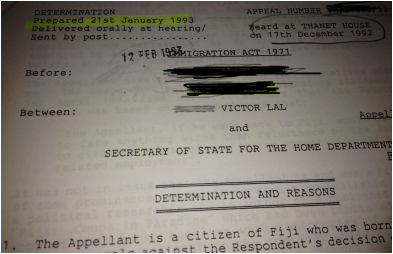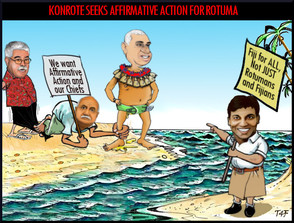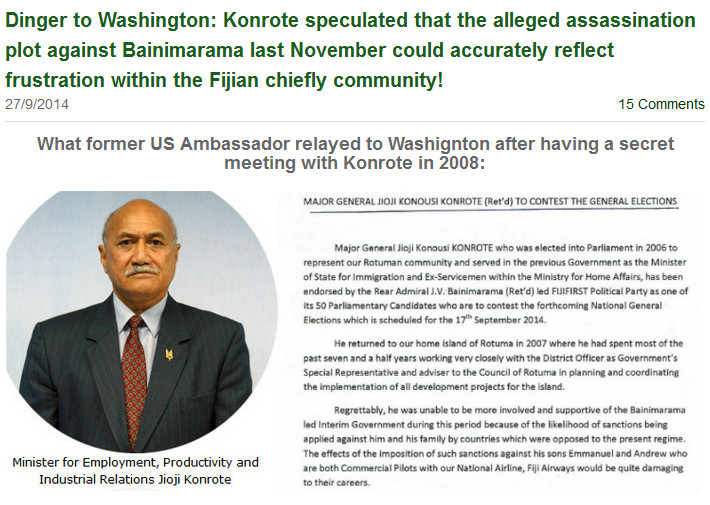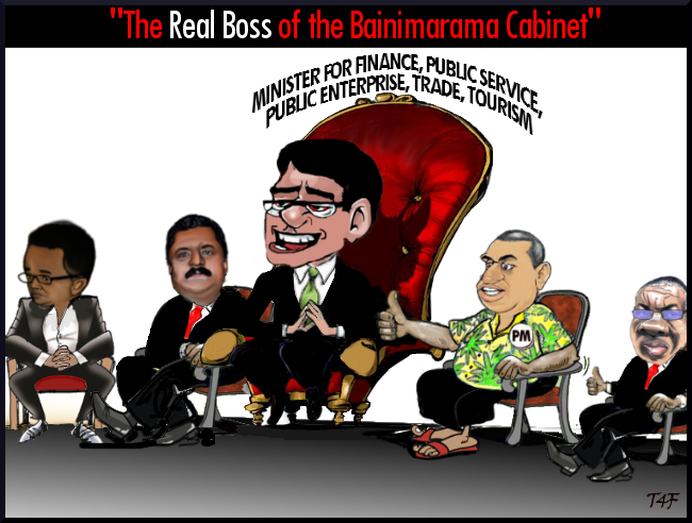If you follow the articles and posts about Fiji on Facebook, you would have come across: "Oni Kirwin".
In one of her essay's, she claims that Native Fijians have been treated by successive government's as 2nd class citizen's. Her posts are actually getting a number of LIKES as many of our native Fijian brothers and sisters actually think that this the truth.
However, the truth is that successive governments have always treated Fiji Indians as 2nd class citizens. Native Fijian's always had access to government scholarships and business grants.
IF you have any articles in your treasure chest which could show that Indians suffered under Rabuka and also Qarase, this would go a long way in reversing the mis-information being put out by Oni Kirwin.
I hope you could take-up my request.
Best wishes,
Jack Sparrow
Fijileaks: Many thanks. We will try and dig out old articles on the subject. The new management of Fiji Sun in 2012 told VICTOR LAL that the scores of opinion pieces he wrote in that paper over several years were being temporarily removed from the archives because they were building a new website; its three years and the articles are not back; REMOVED completely from Fiji Sun archives.

Friday, August 11, 2006
FHRC consulted Government on Affirmative Action Report
By VICTOR LAL
The consultant who reviewed the Affirmative Action programme for the Fiji Human Rights Commission provided ample opportunity to the Prime Minister's Office to respond to various queries. The consultant's recommendations titled 'Report on Government's Affirmative Programmes 2020 Plan for Indigenous Fijians and Rotumans and the Blueprint - June 2006', which the Commission is yet to officially release (but which Victor Lal had revealed in the Fiji Sun), notes that 'the government had decided that rather than the Government submitting comments on the consultant's draft report to the Commission, the Commission should proceed to its publication and public release'.
If it is true, than the Prime Minister is clearly wrong to raise the concern that FHR report on the Blueprint is definitely biased as the Commission consultant did not approach him or his CEO to get the government's side of the story on the setting up of the program. He also expressed concern that the report was only prepared by one consultant who never spoke to anyone at the PM's Office.
Mr Qarase said he is now analyzing the report following comments by the Commission that it would take the government to court if it does not make immediate changes to the Affirmative Action Program. According to the report, the Government was provided with a number of opportunities to be heard during the investigation. It was advised of the intention to investigate and invited to provide information about all affirmative action programmes. In March 2005 the Office of the Prime Minister was advised that a number of government ministries, departments and agencies had not responded to requests for information, and the assistance of that office was sought in obtaining their cooperation - some departments subsequently responded, others did not;
That same month the CEO of the Prime Ministers Department, the report claims, advised that at a discussion of departmental Chief Executive Officers on 18th March 2005 it had been agreed that the Prime Minister's Office would reply on behalf of Government through its Chief Executive Officer, though no response was received.
Over two months later, on 23rd May 2005, the CEO of Prime Ministers Office sent a copy of the publication For the Good of All, which had been tabled in Parliament in 2004. Later, on 24 November 2005, the same CEO sent copies of a second report on the implementation of the affirmative action programmes under the Social Justice Act that had been tabled as Parliamentary Paper No 108 of 2005. The CEO also supplied the Commission with a copy of the Preliminary Analysis by the ADB of the 2002/2003 Household Income and Expenditure Surveys (September 2005) together with comments.
Despite these opportunities already given, the Commission claims, it provided the Government with a final opportunity to comment on the investigators report and the draft report was sent to the government with the request that a response be received by 23 March 2006. The government subsequently sought an extension of time, and the date for final response was amended to 1 May 2006.
On 19 May 2006, according to the report, the CEO of the Prime Minister's Department wrote to the Commission to advise that the government had decided that rather than the Government submitting comments on the consultant's draft report to the Commission, the Commission should proceed to its publication and public release.
In 2004 the Commission had instigated an 'own motion' investigation into the Government's affirmative action programmes under the Social Justice Act 2001, aspects of the Blueprint initiated by the Interim Government in July 2000 and adopted and continued by the SDL Coalition Government, and the Social Justice Act itself. When notified of the Commission's intention to undertake the investigation, the SDL Coalition Government had offered its cooperation, says the report.
The Commission's decision to instigate the own motion investigation was triggered by the number of complaints it received from different sources about the Affirmative Action law and policy as well as by the Commission's own concerns about the proposals of two different Governments to enact Social Justice legislation for Fiji.
The investigation examined whether each affirmative action and blueprint programme, the policy, and the law complied with the requirements for affirmative action in Chapter 5 (section 44) of the Constitution. Based on the consultant's research, the report concludes that overall, but with some exceptions, the affirmative action programmes put in place by Government under the Social Justice Act 2001 do not comply with the Constitution.
The Social Justice Act 2001 does not comply with the Constitution.
It continues as follows:
1) Affirmative action programmes based on ethnicity do not comply with the Social Justice provisions (Chapter 5, section 44) of the Constitution.
2) The programme as a whole lacks a proportional balance between any disadvantage intended to be addressed and the measures being taken to alleviate the disadvantage. Minor or even presumed but non-existent disparities between ethnic groups have been used to justify the complete exclusion of groups other than indigenous Fijians and Rotumans from the bulk of the programmes.
3) The programmes fail to make provision for all who are disadvantaged. This is particularly so in relation to women, who are far more disadvantaged than men. Individual programmes are weighed so disproportionately against Indians, women and other disadvantaged groups as to undermine the legality of all the programmes based on ethnicity.l No programme accurately links its goals to the disadvantage borne by the target group that it is intended to overcome.
4) Few programmes identify any performance indicators and those that do have no historical component. It is therefore not possible to monitor the effectiveness of the programmes without data that identifies trends before and after the programmes were initiated. There is no data that relates to whether alleged disparities between indigenous Fijians and Rotumans and Indians, for example, have reduced in the areas where affirmative action programmes have been introduced.
On the question whether Government has discharged its burden of establishing justification for the programmes, the report says that the Government's principal justification for its affirmative action programmes, that the rural sector is poorer than the urban sector and a majority of indigenous Fijians live in rural areas, is seriously flawed. In fact, the poorest households in rural areas are Indian.
The Government's other main justification (that the average income of indigenous Fijians is below that of Indians and Others and therefore all indigenous Fijians are disadvantaged and entitled to affirmative action) does not meet the legal standards imposed by the Constitution, the Human Rights Commission Act, and international law.
The programmes fail to justify the distinctions based on ethnicity on which most of the programmes are based. The Government has not established that 'the race-based affirmative action programmes meet the legal standards for these particular programmes'.
According to the report,
1) the programmes have not been established in response to a justifiable compelling Government interest;l the programmes are not narrowly tailored to remedy the past discrimination or present disadvantage that they purport to correct;
2) the programmes are not narrowly tailored to exclude from the indigenous Fijian group preferred, any members who are not, or are no longer disadvantaged, through means testing, or class-based and other appropriate measures;
3) the programmes are inflexible, without waiver provisions to narrow their scope;
4) criteria in relation to targets make no reference to those qualified group members in the relevant sector or industry;l there is no evidence that the Government has considered race-neutral alternatives;
5) although the programmes are temporary, the periodic review mechanisms are inadequate;
6) there is little or no consideration given to degree and type of burden, including on excluded groups, caused by the programme.
The report goes on to ask whether affirmative action law and programmes are lawful, and answers in the following:
1) Since the Affirmative Action programmes do not fulfil the requirements of the Social Justice Chapter in the Constitution, they are not protected by the exemption in section 44 (4).
Accordingly, to the extent that certain disadvantaged groups are excluded from the Affirmative Action programmes, they are being unfairly discriminated against in contravention of their rights contained in section 38 (2) of the Constitution.
* Since the Affirmative Action programmes do not fulfil the requirements of section 21 of the Human Rights Commission Act, they amount to unfair discrimination in breach of section 17 of the Act.
* Since the Affirmative Action Programmes do not fulfil the 'special measures' requirements contained in international human rights instruments such as the Convention on the Elimination of All Forms of Racial Discrimination (CERD), they amount to a contravention of the rights contained in section 38 (2) of the Constitution.
* Since the Affirmative Action programmes are based on the Social Justice Act 2001, and the Social Justice Act itself breaches Chapter 5 of the Constitution, the programmes cannot be justified on grounds that they comply with the Act.It concludes by noting that the 50/50 by 2020 Development Plan, the Blueprint and the Social Justice Act 2001 have the combined effect of imposing large-scale discrimination against the minority ethnic groups, specifically on the disadvantaged categories within these groups, and more generally on other disadvantaged groups who have not been provided with affirmative action programmes to improve their conditions of life.
The affirmative action law, policies and programmes do not comply with the requirements of Chapter 5 of the Constitution.
"Lets not forget that this is the same Konrote aka 'Killer George' who, after 14 May 1987, was promoted by Rabuka, and was seen walking around Suva with his own personal AK47 strapped to his back, threatening to shoot any Indian who tried to stand in the way of Rabuka and his ethno-nationalist cause." - Fijileaks commentator

From Fijileaks Archive: "George Konrote, well-connected retired soldier, diplomat, and deposed State Minister, is deeply concerned that Fiji interim Prime Minister Bainimarama, his friend, has been listening to poor advice, particularly from Interim Finance Minister Chaudhry and interim Attorney General Sayed-Khaiyum, and has made a series of decisions that were bound to infuriate the ethnic-Fijian community...Bainimarama has asked Konrote to be Fiji PermRep to the United Nations. Konrote said he has decided to decline the offer because of the threat of Australian and New Zealand visa sanctions which apply to family members. Konrote has two sons who are pilots with Air Pacific and could lose their livelihoods. Konrote
said, otherwise, he would be willing to take the job"
Fijileaks: And yet this racist, coupist thug, was in the forefront of stripping Indo-Fijians of their livelihoods and driving hundreds into exile and banishment from their NATIVE FIJI ISLANDS after the 1987 coups!
08SUVA17
2008-01-22 15:52
2011-08-30 01:44
CONFIDENTIAL
Embassy Suva
E.O. 12958: DECL: 01/23/2018
TAGS: PREL PGOV MARR ASEC CASC FJ
SUBJECT: BRIG.GEN. (RET) KONROTE CONCERNED ABOUT BAINIMARAMA POLICIES THAT FRUSTRATE ETHNIC-FIJIANS
REF: A. SUVA 013
¶B. SUVA 005
¶C. DAO SUVA 220344Z JAN 08
Classified By: Amb. Dinger. Sec. 1.4 (B,D).
Summary
¶1. (C) George Konrote, well-connected retired soldier, diplomat, and deposed State Minister, is deeply concerned that Fiji interim Prime Minister Bainimarama, his friend, has been listening to poor advice, particularly from Interim Finance Minister Chaudhry and interim Attorney General Sayed-Khaiyum, and has made a series of decisions that were bound to infuriate the ethnic-Fijian community. Konrote noted frustrations within the Republic of Fiji Military Forces (RFMF), which stem in part from the same decisions that frustrate the ethnic-Fijian community more broadly. Konrote did not suggest such frustrations will boil into anti-Bainimarama action by the Army, but he left no doubt the frustrations are real. Bainimarama has asked Konrote to be Fiji's Permanent Representative at the UN, but Konrote will decline because of the prospect of Australian and New Zealand visa sanctions against his family. End summary.
Turning down UN role
--------------------
¶2. (C) George Konrote, a retired RFMF Brigadier General, a State Minister in the deposed Qarase government, and a former Fiji High Commissioner to Australia, stopped by for a chat on Jan. 23. He is a savvy observer of the Fiji scene, and he retains cordial relations with his military colleagues, including interim PM Bainimarama. Bainimarama has asked Konrote to be Fiji PermRep to the United Nations. Konrote said he has decided to decline the offer because of the threat of Australian and New Zealand visa sanctions which apply to family members. Konrote has two sons who are pilots with Air Pacific and could lose their livelihoods. Konrote
said, otherwise, he would be willing to take the job (IG).
Worry about the ethnic-Fijian mood
¶3. (C) We asked Konrote what the mood is in the public. He expressed great concern about the ethnic-Fijian community, which remains very unhappy about IG policies and relationships. Konrote mentioned in particular recent IG decisions to reform "land" policies, to appoint an Electoral Boundaries Commission with no ethnic-Fijian members, and to consider changing Fiji's constitutionally-entrenched electoral system. (See reftels). He said the "land" issue, in particular, may stimulate ethnic-Fijians "enough to get them off their butts." Konrote also expressed concern about recent IG moves against Fiji Water and other prominent businesses that will surely affect investor confidence. Konrote noted a sense that Bainimarama is "listening to the wrong people," in particular to interim Finance Minister Chaudhry and interim Attorney General Sayed-Khaiyum.Konrote observed that the recent interim-Cabinet reshuffle accented those relationships.
RFMF frustrated
¶4. (C) Asked the mood within the RFMF, Konrote indicated that many of his Army colleagues are frustrated. They resent (Navy Commodore) Bainimarama's purge of many of the best and brightest within the Army during the past six years in order to solidify Bainimarama's own position. They resent the insertion of Navy officers in senior roles that "green suits" (Army) should hold. And officers, as ethnic-Fijians, are frustrated by the IG decisions, as noted above, that seem tilted toward the interests of Chaudhry and Sayed-Khaiyum. Konrote speculated that the alleged assassination plot against Bainimarama last November could accurately reflect frustration within the Fijian chiefly community. Konrote did not suggest any moves are afoot within the RFMF to replace Bainimarama, but he left no doubt he believes many Fijians, including Army officers, are deeply frustrated by a number of recent Bainimarama decisions. Konrote clearly believes Bainimarama needs to seek and accept better advice than he has been relying on lately. DINGER
Konrote in 2008: Bainimarama has been too reliant on Aiyaz Khaiyum's advice






